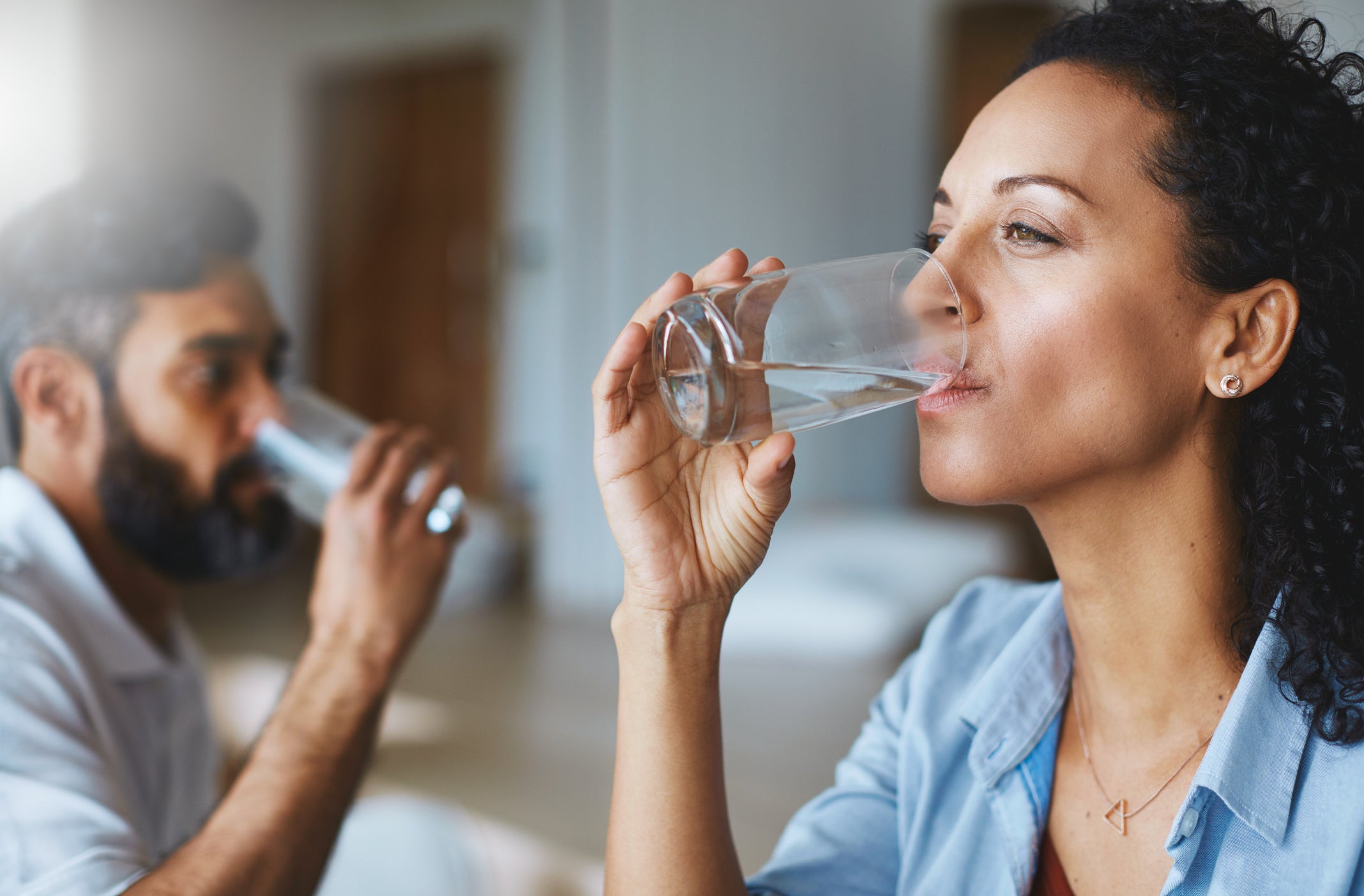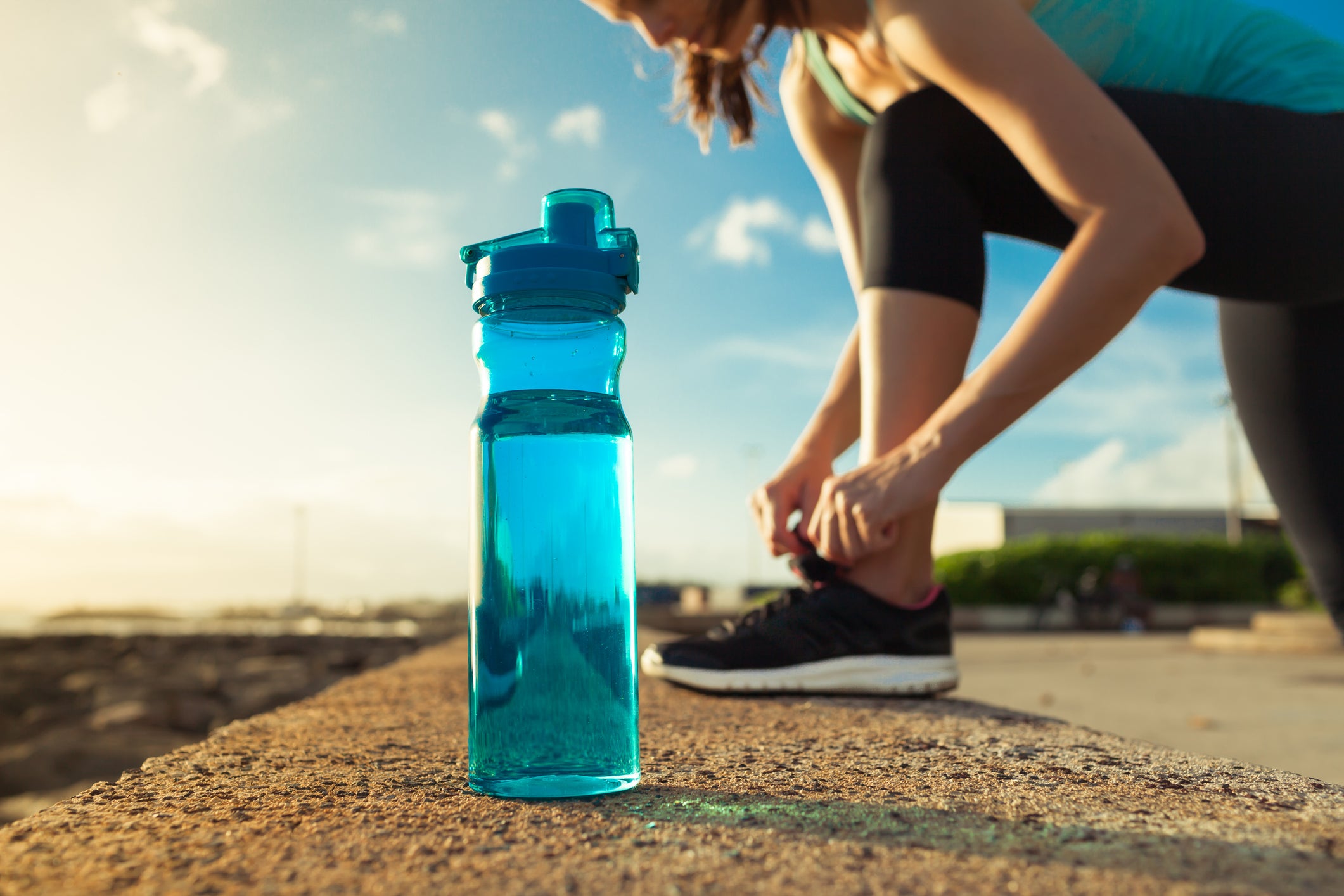Why eight glasses of water a day is a myth when it comes to hydration
As temperatures soar in the UK, heat-related illnesses look set to rise too. But do you know how much water you really need for optimum health? Maria Lally talks to the experts to find out


Last year was the hottest year on record and all the signs are that 2024 will be even hotter. Swathes of southern Europe have battled unseasonably hot temperatures and after months of frequently wet and cooler weather, temperatures are now hitting an annual high in the UK with temperatures soaring to 35 degrees in the South East.
With this comes new health concerns. Earlier this year, the popular TV presenter and author Michael Mosley died from heat exhaustion while walking back to his accommodation on the Greek island of Symi. Four other holidaymakers have lost their lives in similar circumstances in Greece in recent weeks, several others have been reported missing while hiking or walking and this week, Sicily has been turning away tourists due to the country’s brutal heat wave.
“Generally, humans die after a few days without fluid intake,” says Alex Ruani, a researcher in nutrition science at University College London (UCL) and chief science educator at the Health Sciences Academy. “But in extreme heat where fluids and electrolytes [essential minerals, like sodium, calcium, and potassium, that are vital to many key functions in the body such as balancing blood pressure, regulating nerve and muscle function, and hydrating the body] losses are greater, death from dehydration comes a lot sooner.”
At the less extreme end, Ruani says that chronic or severe dehydration can lead to urinary tract infections, kidney stones and a decrease in physical and mental performance. Add in constipation, delirium, seizures, and a drop in blood pressure (fluid loss leads to low blood pressure, which can lead to lightheadedness and fainting) and you can see why staying hydrated can not only help avoid heat exhaustion and heat stroke but is key to staying healthy.
So, how much should we drink? Our body is composed largely of water (about 50 to 70 per cent) and this includes our cells, which need water to function properly. However, a 2023 study from the water bottle brand AirUp found that 45 per cent of British people drink the equivalent of just one glass of water per day, despite official NHS guidelines advising six to eight glasses. This needs to be increased in hot climates, during exercise, or when you’re pregnant and breastfeeding.
“The benefits of staying properly hydrated include enabling your brain to work properly, regulating your body temperature, keeping a steady and rhythmic hormone production, fomenting cell longevity, aiding proper digestion, and helping to eliminate toxins,” says Ruani, who says that proper hydration should be given the same priority as our sleep and exercise habits.
A 2023 study found that people who drink more water live longer and develop fewer chronic illnesses. The research, from the National Institutes of Health (NIH), studied 11,255 adults and found adults with the lowest fluid intake were more likely to develop chronic conditions and show signs of advanced biological ageing compared to those with healthy fluid intake.
Natalia Dmitrieva, the study author at the Laboratory of Cardiovascular Regenerative Medicine at the National Heart, Lung and Blood Institute, which is part of the NIH, said: “The results suggest that proper hydration may slow down ageing and prolong a disease-free life.”
Ruani says many of us don’t drink enough throughout the day to replenish the water we lose through urinating and sweating (roughly 2.5 to 3 litres per day, for a healthy adult). “We tend not to think about drinking water, or even feel thirsty, until we are already a bit dehydrated.” By the time you feel thirsty, she says, you’re probably already about 1 to 2 per cent dehydrated.

She adds that while it’s easy to treat a mild case of dehydration simply by drinking more water, as the European heatwave headlines have shown, chronic or severe dehydration can be life-threatening. When someone experiences heat stroke, the body stops sweating and they may experience seizures or hallucinations. In these extreme cases, it is imperative the person gets an IV drip to rehydrate. Signs you are chronically dehydrated are feeling weaker and experiencing frequent headaches, she says, adding: “But instead of drinking a large amount of water in one go, it’s best to consume water throughout the day.”
It is also possible to drink too much, she says, although this is more rare. “Drinking too much water can dilute the blood while causing levels of sodium, potassium and other electrolytes to fall. This is called hyponatremia, or water poisoning, and can occur when you drink too much in a short space of time, or when there’s an underlying medical condition where the kidneys can’t process it all.”
Several factors, like your weight, activity levels, and how hot it is will affect how much is too much but as a guide, a 2021 study published in the British Medical Journal suggested that drinking 5.3 litres of water over four hours can lead to water poisoning.
When it comes to how much water we need to stay healthy, eight glasses – roughly two litres – is seen as the standard. However, a study in 2022 from the University of Wisconsin-Madison in the US found this may be a myth. Researchers measured the water intake of over 5,000 people from 26 countries, ranging in age from babies to 96-year-olds, and found the amount of water needed to stay healthy varied considerably.
The body will tell you if you need to drink more and when
“The science has never supported the eight glasses thing, if only because it confused total water turnover with water from beverages and a lot of your water comes from the food you eat,” said Dale Schoeller, an emeritus professor of nutritional sciences who co-led the study.
How much water we need depends on many factors. Professor Tim Noakes, emeritus professor in the Division of Exercise Science and Sports Medicine at the University of Cape Town and author of Waterlogged, says there is only one rule when it comes to fluid intake: if you’re thirsty, drink.
“The body will tell you if you need to drink more and when,” he says. “Men are generally larger so they will need to replace more fluid on a daily basis than smaller women. Any cause of fluid loss from the body, including menstruation, will increase the fluid requirements. But the body will indicate what it needs.”
That said, some elderly people may have an impaired thirst mechanism and need to be encouraged to drink more than their thirst directs.
“As we get older, our sense of thirst is reduced, putting us at a higher risk of dehydration,” adds Alex Ruani. “Some elderly adults may also be on medications that increase urine output, so they need to be more cautious.”

Sam Rice, a nutritionist and author of Supercharge Your Diet: Ten Easy Ways to Get Everything You Need From Your Food, says it is worth remembering that “tea, coffee, and milk all count” but adds that we should avoid shop-bought soft drinks as they can be very high in sugar, which has a hypernatremic effect, “meaning it draws water from your tissues and so depletes your body of fluids”.
As for coffee, while it’s often thought to be a diuretic – a 2016 study found that the hydrating effects of water, coffee and tea were almost identical – it contains caffeine so it should be drunk in moderation. Rice says that water in food also counts, especially fruits and vegetables with a high water content, such as melon (especially watermelon), strawberries, cucumber, lettuce and celery.
“In truth, the simple rule to make sure you are getting enough is to drink a glass of water with every meal in addition to what you usually drink”, says Rice. Another gauge is how often you pee, which should ideally be five to six times a day. Less than that and you probably need to drink more water.”
Ruani suggests checking that your urine looks light and clear, like the colour of pale straw, throughout the day (the first urine of the day will be darker because you haven’t consumed any water during the night).
“Another indicator is the ‘skin turgor test’,” she says. “This might not work with older adults because their skin is less firm. But if you pinch a bit of skin on the back of your hand, does the skin go back down immediately after you release it, or does it stay up a bit? It may be a sign of dehydration if the skin stays up after you let it go.”
In which case, go and pour yourself a large glass of water...
Subscribe to Independent Premium to bookmark this article
Want to bookmark your favourite articles and stories to read or reference later? Start your Independent Premium subscription today.

Join our commenting forum
Join thought-provoking conversations, follow other Independent readers and see their replies
Comments